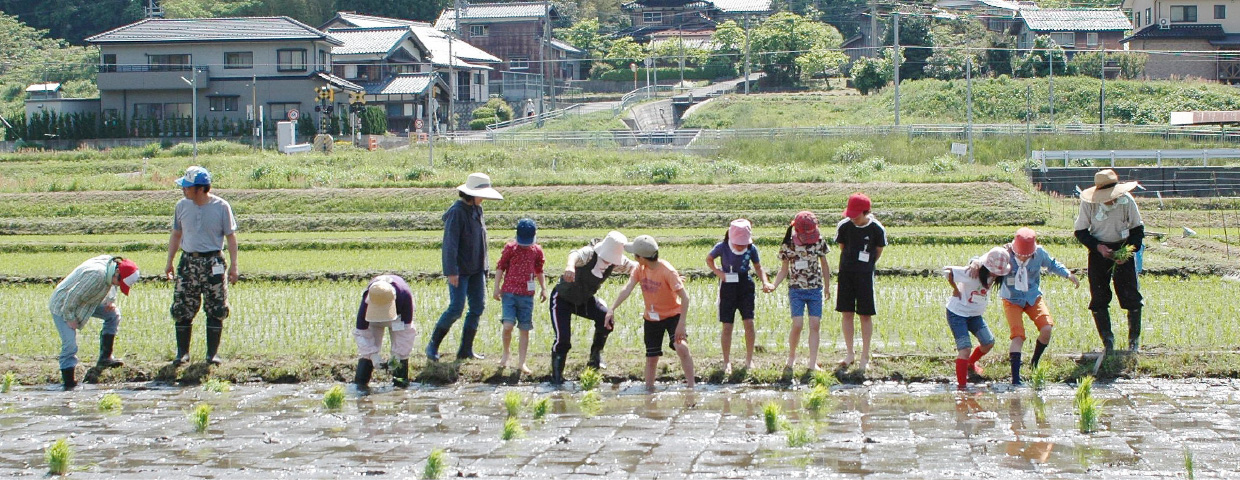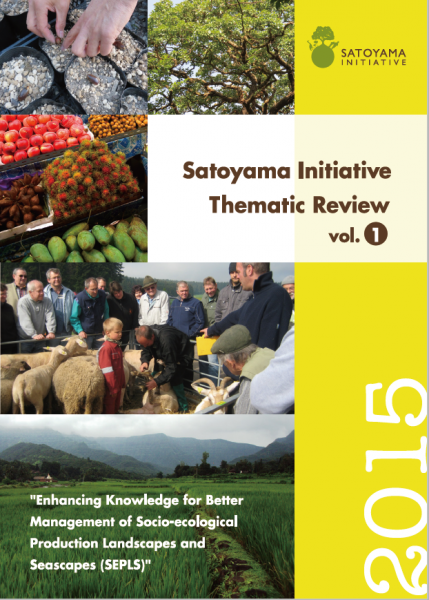The “Satoyama Initiative Thematic Review” is a yearly publication series, comprising a compilation of IPSI case studies providing knowledge and lessons related to “socio-ecological production landscapes and seascapes (SEPLS)”. It aims to collect experiences and relevant knowledge, especially from practitioners working on the ground, taking advantage of their potential for providing concrete and practical knowledge and information as well as contributing to policy recommendations. It also includes a synthesis chapter produced to clarify its relevance to policy and academic discussion and to help make lessons learned practical in the field.
The Satoyama Initiative Thematic Review vol. 1 (SITR-v1-web.pdf) showcases various case studies from around the world focusing on tools and approaches for “Enhancing knowledge for better management of socio-ecological production landscapes and seascapes (SEPLS)”, in particular those that are used by and with local communities and other stakeholders to deepen understanding of SEPLS and their management. The case studies demonstrate that appropriate selection and thoughtful use of tools and approaches can provide various different positive outcomes, not merely increasing knowledge but also creating preferable conditions that can lead to effective actions for SEPLS.
These eleven case studies are by authors belonging to IPSI member organizations, and present varied experiences using tools and approaches for dealing with knowledge related to SEPLS management in 13 countries (China, Japan, Taiwan, Philippines, Vietnam, Thailand, Tonga, New Zealand, Germany, Turkey, Kenya, Uganda and Guyana) and in various socio-ecological conditions, from mountainous to coastal ecosystems and from suburban to rural settings.
Table of Contents:
| Title | Name | Organisation |
| Enhancing knowledge for better management of socio-ecological production landscapes and seascapes:
appropriate tools and approaches for effective action (synthesis chapter) |
Suneetha M. Subramanian,
Kaoru Ichikawa, Ayako Kawai |
UNU-IAS |
| Community-based monitoring and information systems as an emerging toolkit to improve management of SEPLS | Maurizio Farhan Ferrari,
Caroline de Jong |
Forest Peoples Programme (FPP) |
| Historical changes of co-management and biodiversity of community forests: A case study from S village of Dong minority in China, 1950-2010 | Minghui Zhang, Boya Liu,
Jinlong Liu |
Renmin University of China |
| Socio-ecological linkages in Japan’s Urato Islands | Akane Minohara, Robert Blasiak | The University of Tokyo |
| Promoting resilience of socio-ecological production landscapes and seascapes in the Datça-Bozburun Peninsula, Turkey | Gregory Mock, Diana Salvemini, Nick Remple | UNDP |
| Raising and planting native tree seedlings in local community of Aichi Prefecture, Japan | Hitomi Horie | Aichi Prefectural Government, Japan |
| The importance of the Farmers Field School approach: A case study – Farmers Field School practical training programs, Vietnam | Kien To Dang | Social Policy Ecology Research Institute (SPERI) |
| Landscape conservation in the Black Forest, Germany | Marie Kaerlein, Bernd Blümlein, Susanne Kopf | German Association for Landcare (DVL) |
| Enhancing Knowledge of SEPLS in Vava’u, Kingdom of Tonga | Stuart Chape,
James Atherton, Jacob Salcone, Amanda Wheatley |
SPREP |
| SEPLS definition and issues assessment – a case of Uganda’s drylands | William Olupot | Nature and Livelihoods |
| Converting pests into allies in tea farming – a SEPL case in Hualien, Taiwan | Jung-Tai Chao,
Ling-Ling Lee |
SWAN International |
| Assessing farmers’ perceptions of resilience of socio-ecological production landscapes in central and eastern Kenya | Yasuyuki Morimoto, Patrick Maundu, Dunja Mijatovic, Nadia Bergamini, Pablo Eyzaguirre | Bioversity International |
A wide range of tools and approaches is covered, including quantitative tools such as field data measurement and collection, questionnaires, literature surveys, indicator assessment and participatory mapping. The cases also cover ways to involve local communities in enhancing knowledge, such as community dialogues, “Farmers Field Schools”, anthropological research and community-based monitoring, as well as particular approaches involving daily and continuous interaction and networking.
Findings from the case studies are summarized in a synthesis chapter, which highlights six positive outcomes that the use of tools and approaches can produce and extracts eight principles to consider when using tools and approaches to ensure effective processes and better outcomes in enhancing knowledge for better management of SEPLS.
| Six positive outcomes produced by the tools and approaches:
(1) Value articulation (2) Knowledge creation (3) Policy advocacy (4) Awareness-raising (5) Better networking (6) Better understanding of trade-offs and synergies |
Eight principles to consider when using tools and approaches:
(1) Select and design tools and approaches to fit into the local context (2) Understand local contexts first (3) Find entry points to local communities and ensure wider engagement (4) Familiarize the community with tools and approaches, and make objectives clear (5) Sufficiently consider pros and cons of using different tools and approaches (6) Ensure capacity building (7) Provide feedback (8) Feedback cycles: adjust tools and approaches after implementation |
Please click on the image below to download the Satoyama Initiative Thematic Review vol. 1.




